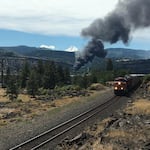
Train derailment fire as seen from Coyote Wall area on Washington state Route 14.
Courtesy of Derek Greenwood
After three failed attempts, Oregon lawmakers appear poised to pass a bill regulating the transport of oil by rail through the state.
House Bill 2209 passed the House on a 56-3 vote Monday and now moves to the Senate, where advocates for the legislation also expect it to pass.
The bill puts railroads hauling crude oil or liquefied natural gas under the purview of the state’s oil spill planning program. That’s meant to ensure adequate preparations are in place to prevent and respond to oil spilling from derailed and punctured tank cars.
The bill also establishes fees on those railroads that would fund the additional work Oregon’s Department of Environmental Quality needs to do to prepare for oil moving throughout the state — such as along the Deschutes River, for instance — where it hadn’t before.
Related: Petroleum Terminal Expands To Allow More Oil Trains Into Portland
It marks the most significant step Oregon lawmakers have taken to regulate oil trains since a train derailed and caught fire in 2016 along the Columbia River in Mosier, Oregon. Environmental advocates say the long-awaited bill closes a gap Oregon left in West Coast regulations.
“The bill is strong and mostly brings Oregon law up to par with Washington state,” said Ryan Rittenhouse, conservation organizer for Friends of the Columbia Gorge. “There is room for further improvement, but passage of this bill is a great step in the right direction to holding rail oil transporters more accountable for the grave risks involved.”
BNSF Railway spokeswoman Courtney Wallace said the company, one of the main haulers of crude oil across the country, is working with state officials on possible plans to implement the new requirements of the bill.
“BNSF remains concerned about new tax and fee proposals that could disproportionately burden common carriers and, in doing so, shift transport of hazardous materials to less safe modes of transportation,” Wallace said in an emailed response to questions.
Wallace did not respond to a question about whether such fees already in place in Washington and California had actually caused BNSF, which reported profits of $1.25 billion in the first quarter of 2019, to raise its rates and lose oil shipments to other modes of transportation.
Mile-long trains of black tank cars carrying crude oil first began rolling through the Northwest in 2012 when oil drilling outpaced what the continent’s pipelines could carry.
Related: Before Mosier Derailment, Union Pacific Lobbied Oregon Against Tougher Oil Train Rules, And Won
Environmental and safety regulators in the Northwest weren’t prepared for the surge in oil by rail. Oregon’s Department of Environmental Quality, which regulates oil spill planning and response for pipelines, ships and tank storage facilities, had no such authority for trains.
Meanwhile, a series of spills and explosions — an oil train killed 47 people in 2013 in Lac-Mégantic, Quebec — prompted calls for better regulation across the country.
Lawmakers in Washington and California passed comprehensive oil train bills in 2014 and 2015, but in Oregon efforts to pass comprehensive oil train legislation wilted year after year against industry lobbying efforts.
As a result, oil spill planners in Oregon have struggled to get straight answers about what kind of oil was moving through Oregon’s cities and along its rivers.
In 2016, when 16 oil tank cars derailed and caught fire in the Columbia River Gorge town of Mosier, Oregon, the Washington Department of Ecology sent 22 people, two boats and a helicopter to contain and clean up the damage. Oregon’s DEQ sent seven people — essentially its entire spill unit.
Related: Tar Sands Crude Shipments Quietly Increased In Oregon, With Regulators In the Dark
But with the added funds and oversight from HB 2209, if one of those derailments happened on a river like the Willamette or Deschutes that doesn’t border Washington, Oregon regulators would be better equipped to handle it on their own.
“It would make high hazard rail transportation in Oregon subject to the same spill response planning requirements as vessels, pipelines and facilities,” DEQ spokeswoman Susan Mills said in a statement.
That includes filing oil spill contingency plans that are subject to state oversight.
It also involves routine drills and exercises to ensure railroads can properly execute those response plans in the event of a spill.
